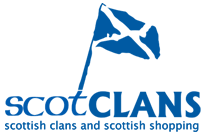WordPress database error: [Got error 28 from storage engine]
SELECT t.*, tt.*, tr.object_id FROM wp_terms AS t INNER JOIN wp_term_taxonomy AS tt ON tt.term_id = t.term_id INNER JOIN wp_term_relationships AS tr ON tr.term_taxonomy_id = tt.term_taxonomy_id WHERE tt.taxonomy IN ('category', 'post_tag', 'post_format') AND tr.object_id IN (5265, 5528, 50733, 54087) ORDER BY t.name ASC
Currie History
**Currently being worked on**
Although not a Clan with a chief the Curries came from MacMhuirrichs (pronounced MacVurich), Currie being an anglicised evolution of the name. The MacMhuirrich were a highly distinguished Clan, they were noted for their high literacy, which was not a common thing back in Clan times. The MacMhuirrich’s studied heroic literature and genealogy of the ancient Gaelic world.
Following the Jacobite defeat at Culloden many names became anglicised. The name MacMhuirrich could be seen in a variety of forms before settling on Currie (Curry and Currey included), variations before included McCurrie in the Hebrides, MacMureach, MacVurich, and MacCurry (remember Mac just means ‘son of’).
Some people mistakingly think that the surname Currie comes from the place name in Edinburgh, but the origins date back much further, they go all the way back to 1180 in Ireland with the original founder Muiredach O’Daly (Muireadhach Ó Dálaigh) [1180 - 1222 AD]. Muiredach O’Daly was a renowned poet of his times. The O’Daly ancestry is recorded in the Genealogies and Arms in Dublin Castle where the O’Daly line goes right back to Conn of the Hundred Battles, the 110th High King of Ireland in 177 AD. Clan Currie can boast that it is one of the oldest traceable families in Europe.

Clan Founder, Muireadhach O’Daly of Sligo, Ireland
In the 13th Century Muiredach O’Daly was asked to pay rent from a servant of the King of Tyrconnell, this was an insult to a man of such standing as Muiredach O’Daly. The outcome of this is said to be that O’Daly murdered this servant of the King by taking out an axe and cutting his head in two. In doing so he was forced to flee Ireland, in 1213 he headed for Scotland, he had also made a mortal enemy of powerful chief of the O’Donnels.
Muiredach penned these words:
Trifling our quarrel with the man
A clown to be abusing me
And me to kill the churl,
Dear God, is this a cause for enmity?
After roaming around Scotland writing poetry Muiredach ended up on Islay, the stronghold of Clan Donald, Lord of the Isles. Islay is a small Scottish island known these days for being the home to some of the best whiskies in the world with eight working distilleries.
Muiredach fathered eleven children while he was here. His descendants were celebrated for being great poets going off to study to be professional bards and their sons in turn. A bard is also known as “Sennachie”. They had to study for seven years, much in colleges in Ireland to become what has been described as a ‘professor of literature and a man of letters.’ He must know the history and pedigree of his patron back into the mists of time; he must record his decrees. And he must broadcast the glory of his deeds, and inspire his warriors.
So began the lineage of the Curries. So how did O’Daly become Currie? The children Muiredach became Mhuireadhaigh meaning ‘son of Muiredach’ this then became MacMhuirichs.
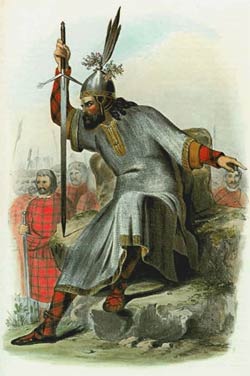
MacDonald, Lord of the Isles – a Victorian illustrator’s impression (MacIan)
For the next five centuries the descendants of Muiredach were to serve the earls of Lennox then later the Lords of the Isles (Clan MacDonald). These were powerful rulers, they controlled most of the Western side of Scotland, the islands and so the Western seas. The Lords of the Isles were at one time arguably more powerful than the Kings of Scotland and controlled a lot of the decisions being made from the Royal court. Clan MacMhuirichs as it was evolving was given the job and role of documenting the goings on in their court which was based on the island in the loch of Finlaggan on Islay. So they were the court’s hereditary bards.
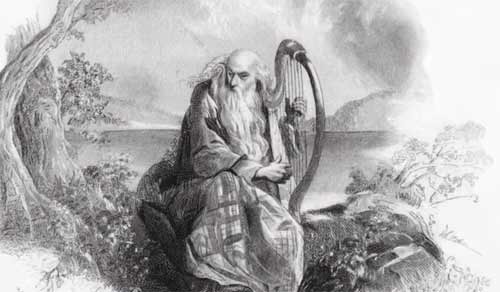
The bard in Medieval Scotland was seen as the most highly exalted position, second only to the Clan Chief.
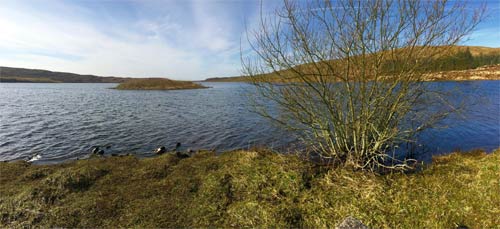
The Council Isle Finlaggan, photo taken earlier this year when we visited Islay.
The role of hereditary bards was far from a menial role they were celebrated far and wide. In the great hall at Finlaggan, the MacMhuirichs would be honoured by being seated at banquets before Maclean, MacLeod, MacNeill, MacKinnon, MacQuarrie and the other Island chiefs. Theirs was an oral society that relied on the bards and seanachaidhs, the storytellers, to preserve and promulgate the renown of the clan.
The MacMhuirichs weren’t exempt from battles and went with Clan Donald to Bannockburn, Killiecrankie, Sheriffmuir and even at Culloden. At the decisive battle of Harlaw in 1411, when the Lord of the Isles sought to enforce his claims to the lands of the Earldom of Ross against the Stewarts, it was Lachlan Mr MacMhuirrich (1370-1438) who composed the incitement to Battle. The Clan motto ever since that day, has been “Inspire to Victory”.
O battle-loving Warriors,
O brave, heroic firebrands
The Children of Conn of the Hundred Battles,
O Children of Conn, remember
Hardihood in time of battle.
In battle the bard was very important, if the Chief fell the army would turn to them to say who next in line would be.
The power of the Lords of the Isles had become too much of a problem for the Kings of Scotland and England and so were systematically wiped out in 1493. The Lord of the Isles John MacDonald forfeited his estates and titles to King James IV of Scotland. This was the end of The Lords of The Isles but not the end of the MacMhuirichs who moved up to South Uist and became the principal bards Clan Ranald (Also Clan MacDonald). Members of the clan filled the posts that required brains and literacy rather than brawn, acting as musicians, parsons and lawyers.
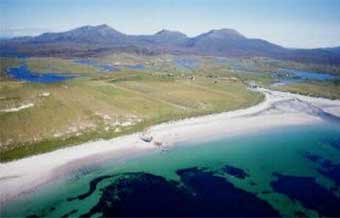
South Uist
The MacMhuirich’s had already served Clan Donald for more than 300 years. The Clan Ranald’s produced the largest amount of gaelic poetry notably The Red Book. The work of MacMhuirichs can been seen within it’s pages.
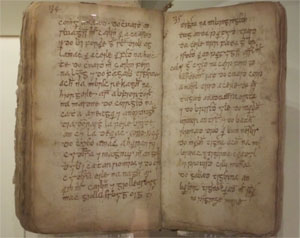
The Red Book of The Clan Ranalds
But the power of the MacDonalds was to wane again, this time they ran out of money and in doing so couldn’t support a bard. The work of the MacMhuirichs became more common place, poetry about day to day life. This went on well into the 1700s. In 1746 Bonnie Prince Charlie defeat at Culloden led to gaelic being wiped out around Scotland. The Highland way of life was attacked, it’s symbols banned; tartan was prohibited, the playing of bagpipes was prohibited and gaelic language and culture was systematically destroyed.
With the destruction of the gaelic language went 500 years of prose, in effect the history of Scotland was becoming an alien language, no one could understand it. It’s value was lost. Beautiful, unique manuscripts became worthless and were torn up to be used for the vellum (calf skin) they were made out of. There are tales of how torn pieces were used to patch clothes or fuel peat fires in the blackhouses. Heartbreaking to think about this now, these educated words of the time in the language of the time are now lost in the mists.
It is not all gone in The Red Book of Clanranald which contains the history of Clan Donald was put together by Niall MacMhuirich of Uist in the early 18th Century and acquired by James ‘Ossian’ Macpherson when he travelled the Highlands in 1760. Also the Annals of the Four Masters.
Niall MacMhirich (1637-1726) the last of the Bardic race, he chronicled James Graham and the great Montroses campaign against Cromwell. in the last body of Gaelic Prose to be written in Scotland in the ancient Irish Script style. When he died in 1726, the Bardic Order became extinct in Scotland.
Silence – until 1959 when William McMurdo Currie starts to research the MacMhuirich history realising that it was far too important to be lost forever. He forms a Clan Currie Society. At the same time gaelic scholars in Edinburgh and Glasgow are starting to say that this poetry is too important. Interest grows from this point to today.
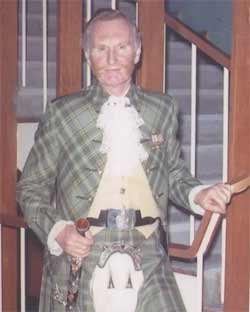
William McMurdo Currie
After his death in 1992 the leadership of the Society passed to Robert Currie of the United States. The Society continues to grow from strength to strength. Honoring their roots the Clan Currie Society is run more like an arts foundation offering arts scholarships, getting involved in filmmaking, dance and music. They are very active Clan Society they even run Tartan Day on Ellis Island. The Society also achieved a coat of arms in 2006 to be used by Society members:
The surname Currie is also seen as a sept of Clan Donald and has very close ties with them. But the MacMhuirrchs were a Clan in their own right and not just a sept of Clan Donald. In a document written from South Uist in 1707, Macdonald of Clan Ranald grants land to Donald McMureac:
“I give and grant the lands of Staoligarry to Donald MacMureach in virtue of the station and office he presently serves me as bard and Sennachie and failing heirs of his own body I bind and oblige me and my descendants to warrant the Tack unto any other of the same Clan and tribe McMureach.”
So Clan Currie are quite a unique Clan with a fantastic history.
